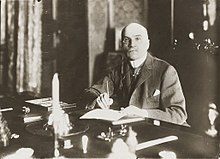Maurice Paléologue
Maurice Georges Paléologue (born January 13, 1859 in Paris , † November 21, 1944 there ) was a French diplomat and writer .
Life
Paléologue was born as the son of Alexandru Paleologu, a descendant of a Wallachian boyar family who fled to France after the Romanian Revolution of 1848 and his wife, who came from Belgium. As an illegitimate child, his father had received the maiden name of his maternal grandmother. To what extent the name can be traced back to the Byzantine ruling house of the paleologists is uncertain. Paléologue, however, was proud of this presumed descent throughout his life.
His classmates at the Lycée Louis-le-Grand included the later presidents Alexandre Millerand and Raymond Poincaré , the latter in particular being one of his political supporters in later years. After studying law , Paléologue joined the French Foreign Ministry in 1880 at the age of 21 . First, he completed subordinate posts in Tangier , Beijing and Rome . Foreign Minister Théophile Delcassé appointed him Ministre plénipotentiaire in 1901 and promoted his career in particular. Paléologue was considered a “discovery” of Delcassé. Paléologue also managed to network well in the Foreign Office through his family, he was brother-in-law of Paul and Jules Cambon , the French ambassadors in London and Berlin .
With the fall of Delcassé, his star initially sank and he went to Sofia as ambassador from 1907 . From there, the new Prime Minister Poincaré called him back to Paris in 1912 and appointed him director of the political department on the Quai d'Orsay , the seat of the Foreign Ministry. Although there had been repeated criticism of his reports from Bulgaria , Poincaré found a colleague in Paléologue who above all shared his positions on the German Empire . In this role he particularly promoted the development of the Triple Entente and above all the French-Russian Alliance . He also encouraged Poincaré in French involvement in the Balkans.
In January 1914, Paléologue was appointed French ambassador to the Tsar's court in St. Petersburg . During the July crisis , he strengthened the Russian tsarist empire in its tough stance towards the Central Powers . Paléologue remained ambassador to Russia during the First World War until the October Revolution .
Under his former schoolmate Millerand, he became Secretary General in the Ministry of Foreign Affairs after he took over the office of Prime Minister in 1920. In the following year he retired and concentrated on his work as a writer, which he had already started during his diplomatic career. He became known as a publicist primarily with his work over his years at the court of the tsars during the war ( La Russie des Tsars pendant la grande guerre ), which appeared in 1922. In addition, he published works on the last Tsarina Alexandra Fjodorowna , Count Cavour and Empress Elisabeth of Austria . In 1928, Paléologue was appointed a member of the Académie française . He died in Paris in 1944.
Works (selection)
- The tragic novel of Emperor Alexander II. Translation by N. Collin. Kurt Ehrlich Verlag, Berlin 1925
- At the Tsar's court during the World War. Diaries and reflections of the French ambassador in Petersburg. Two volumes. Introduction by Benno von Siebert . Translation by Leontine Rottenberg. Publishing house F. Bruckmann, Munich 1926
- Confidential talks with the Empress Eugénie. Translation by Else and Karl Werkmann . Paul Aretz Verlag, Dresden 1928
- Cavour. A great realist. Translation by Paul Baudisch. S. Fischer Verlag, Berlin 1928
- Three diplomats. Talleyrand, Metternich, Chateaubriand. Translation by Marta Flersheim. Julius Bard Publishing House, Berlin 1929
- Alexander I. The enigmatic tsar. Translation by Willy Grabert. Paul Neff Verlag, Berlin 1937
- Empress Elisabeth of Austria. Translation by Paul Aretz . Alfred Scherz Verlag, Bern 1946
- Wilhelm II. And Nikolaus II. Translation by Paul Aretz. Alfred Scherz Verlag, Bern 1947
- Diary of the Dreyfus affair. Translation by Helmut Lindemann . Deutsche Verlags-Anstalt, Stuttgart 1957
- The end of the Romanovs. Arrangement by Christoph Meyer. Bruckmann Verlag, Munich 1962
Individual evidence
- ↑ Christopher Clark : The Sleepwalkers. How Europe moved into World War I. , Deutsche Verlags-Anstalt, Munich 2013, ISBN 978-3-421-04359-7 , p. 558
- ↑ Curriculum vitae on the Académie française website , accessed on January 5, 2014
- ↑ a b Christopher Clark: The Sleepwalkers. How Europe moved into World War I. , Deutsche Verlags-Anstalt, Munich 2013, ISBN 978-3-421-04359-7 , p. 561
- ^ Stefan Schmidt: France's foreign policy in the July crisis 1914. A contribution to the history of the outbreak of the First World War. (= Paris Historical Studies , Volume 90) Verlag Oldenbourg, Munich 2009, ISBN 978-3-486-59016-6 , p. 25, p. 356. Online perspectivia.net.
literature
- Christopher Clark : The sleepwalkers. How Europe moved into World War I. , Deutsche Verlags-Anstalt, Munich 2013, ISBN 978-3-421-04359-7
Web links
- Maurice Paléologue in the online version of the Reich Chancellery Edition Files. Weimar Republic
- Short biography and list of works of the Académie française (French)
- Newspaper article about Maurice Paléologue in the 20th century press kit of the ZBW - Leibniz Information Center for Economics .
| personal data | |
|---|---|
| SURNAME | Paléologue, Maurice |
| ALTERNATIVE NAMES | Paléologue, Maurice Georges |
| BRIEF DESCRIPTION | French diplomat and writer |
| DATE OF BIRTH | January 13, 1859 |
| PLACE OF BIRTH | Paris |
| DATE OF DEATH | November 21, 1944 |
| Place of death | Paris |
